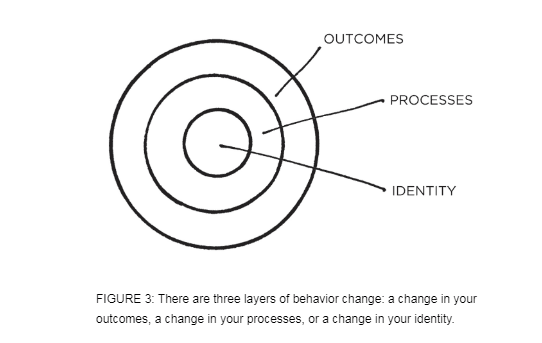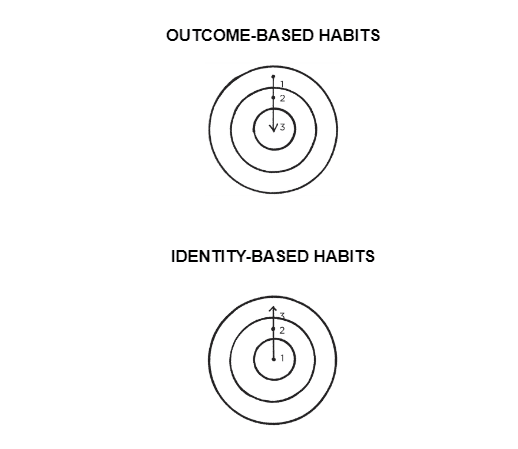Explore the World's Best Ideas
Join today and uncover 100+ curated journeys from 50+ topics. Unlock access to our mobile app with extensive features.
Chapter 2 How Your Habits Shape Your Identity (and Vice Versa)
WHY IS IT so easy to repeat bad habits and so hard to form good ones?
It often feels difficult to keep good habits going for more than a few days, even with sincere effort and the occasional burst of motivation.
Habits like exercise, meditation, journaling, and cooking are reasonable for a day or two and then become a hassle.
Changing our habits is challenging for two reasons:
- we try to change the wrong thing
- we try to change our habits in the wrong way.
558
2.71K reads
THREE LAYERS OF BEHAVIOR CHANGE
Our first mistake is that we try to change the wrong thing.
To understand what I mean, consider that there are three levels at which change can occur.
THREE LAYERS OF BEHAVIOR CHANGE
- The first layer is changing your outcomes.
- The second layer is changing your process.
- The third and deepest layer is changing your identity.
545
1.84K reads
1. Changing Your Outcomes
It is concerned with changing your results: losing weight, publishing a book etc .
516
2.12K reads
2. Changing Your Progress
It is concerned with changing your habits and systems: implementing a new routine at the gym, decluttering your desk for better workflow etc .
523
1.73K reads
3. Changing Your Identity
This level is concerned with changing your beliefs: your worldview, your self-image, your judgement about yourself and others.
Outcomes are about what you get. Processes are about what you do. Identity is about what you believe.
Many people begin the process of changing their habits by focusing on what they want to achieve. This leads us to outcome-based habits.
The alternative is to build identity-based habits. With this approach, we start by focusing on who we wish to become.
561
1.37K reads
Outcome-Based Habits & Identity-Based Habits
Imagining two people resisting cigarette. When offered a smoke, the first person says, “No thanks. I’m trying to quit.” The second person declines by saying, “No thanks. I’m not a smoker.”
It’s a small difference, but this statement signals a shift in identity. Smoking was part of their former life, not their current one. They no longer identify as someone who smokes.
We never shift the way they look at ourselves, and we don’t realize that our old identity can sabotage our new plans for change.
553
1.25K reads
You may want better health, but if you continue to prioritize comfort over accomplishment, you’ll be drawn to relaxing rather than training.
You have a new goal and a new plan, but you haven’t changed who you are.
The ultimate form of intrinsic motivation is when a habit becomes part of your identity.
It’s one thing to say I’m the type of person who wants this. It’s something very different to say I’m the type of person who is this.
549
1.18K reads
The more pride you have in a particular aspect of your identity, the more motivated you will be to maintain the habits associated with it.
If you’re proud of how your hair looks, you’ll develop all sorts of habits to care for and maintain it.
Improvements are only temporary until they become part of who you are.
The goal is not to read a book, the goal is to become a reader.
554
1.05K reads
Your behaviors are usually a reflection of your identity.
When your behavior and your identity are fully aligned, you are no longer pursuing behavior change. You are simply acting like the type of person you already believe yourself to be.
Identity change can be a powerful force for self-improvement.
The biggest barrier to positive change at any level—individual, team, society—is identity conflict. Good habits can make rational sense, but if they conflict with your identity, you will fail to put them into action.
538
982 reads
THE TWO-STEP PROCESS TO CHANGING YOUR IDENTITY
Your identity emerges out of your habits. You are not born with preset beliefs. Every belief, including those about yourself, is learned and conditioned through experience.
More precisely, your habits are how you embody your identity. When you make your bed each day, you embody the identity of an organized person.
The more you repeat a behavior, the more you reinforce the identity associated with that behavior.
Your identity is literally your “repeated beingness.”
This is a gradual evolution.
547
933 reads
This is one reason why meaningful change does not require radical change.
Small habits can make a meaningful difference by providing evidence of a new identity. And if a change is meaningful, it actually is big. That’s the paradox of making small improvements.
The most practical way to change who you are is to change what you do.
527
918 reads
New identities require new evidence. If you keep casting the same votes you’ve always cast, you’re going to get the same results you’ve always had. If nothing changes, nothing is going to change.
It is a simple two-step process:
- Decide the type of person you want to be.
- Prove it to yourself with small wins.
550
891 reads
For example, “Who is the type of person who could write a book?” It’s probably someone who is consistent and reliable. Now your focus shifts from writing a book (outcome-based) to being the type of person who is consistent and reliable (identity-based).
Your habits shape your identity, and your identity shapes your habits. It’s a two-way street.
The focus should always be on becoming that type of person, not getting a particular outcome.
534
832 reads
Conclusion
- Your identity emerges out of your habits. Every action is a vote for the type of person you wish to become.
- Becoming the best version of yourself requires you to continuously edit your beliefs, and to upgrade and expand your identity.
- The real reason habits matter is not because they can get you better results (although they can do that), but because they can change your beliefs about yourself.
553
1.01K reads
IDEAS CURATED BY
Curious about different takes? Check out our Atomic Habits Summary book page to explore multiple unique summaries written by Deepstash users.
Sargun 's ideas are part of this journey:
Learn more about books with this collection
Seeking support from others
Identifying the symptoms of burnout
Learning to say no
Related collections
Different Perspectives Curated by Others from Atomic Habits
Curious about different takes? Check out our book page to explore multiple unique summaries written by Deepstash curators:
2 ideas
8 ideas
Aakash Patil's Key Ideas from Atomic Habits
James Clear
1 idea
Pratik Sumbe's Key Ideas from Atomic Habits
James Clear
Discover Key Ideas from Books on Similar Topics
Read & Learn
20x Faster
without
deepstash
with
deepstash
with
deepstash
Personalized microlearning
—
100+ Learning Journeys
—
Access to 200,000+ ideas
—
Access to the mobile app
—
Unlimited idea saving
—
—
Unlimited history
—
—
Unlimited listening to ideas
—
—
Downloading & offline access
—
—
Supercharge your mind with one idea per day
Enter your email and spend 1 minute every day to learn something new.
I agree to receive email updates

